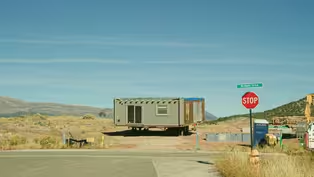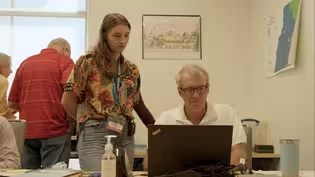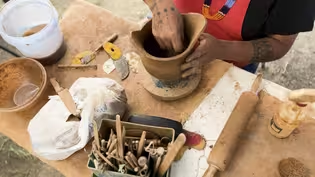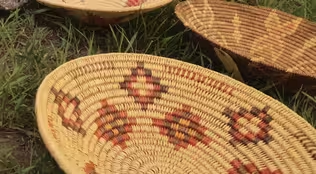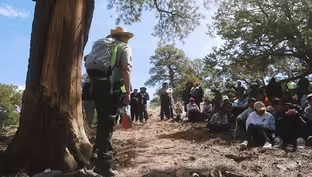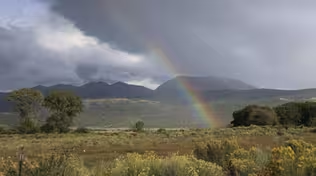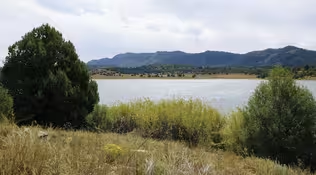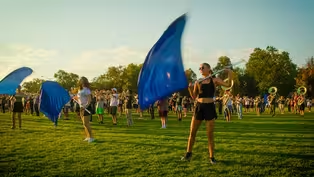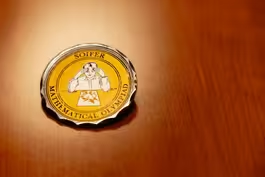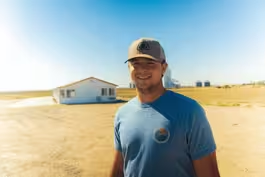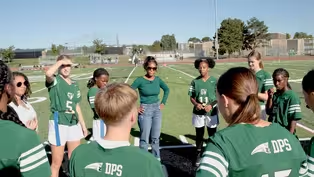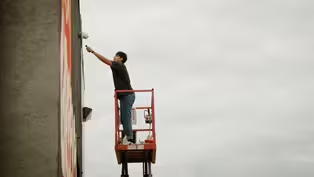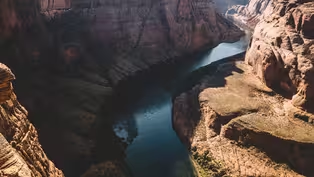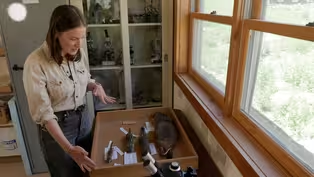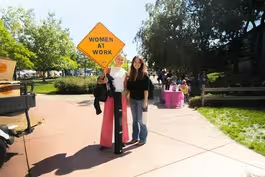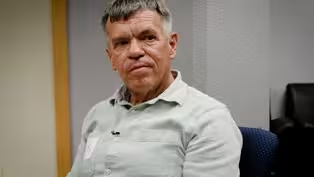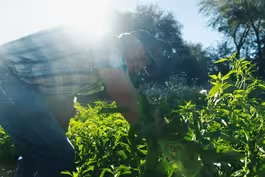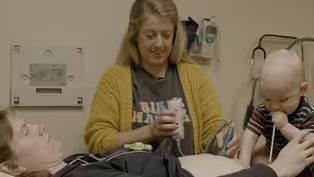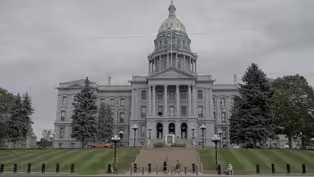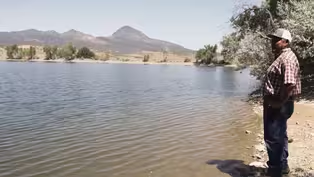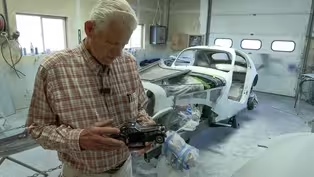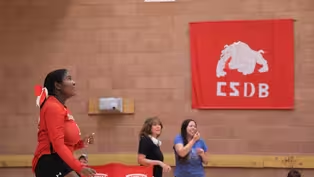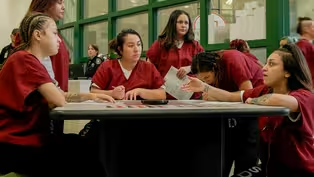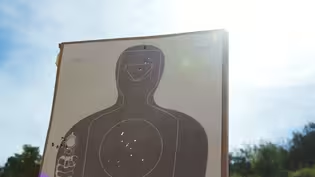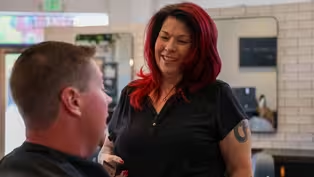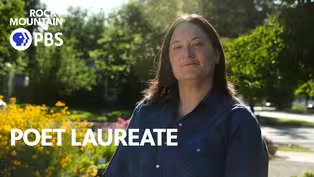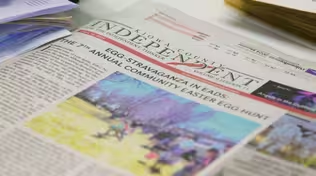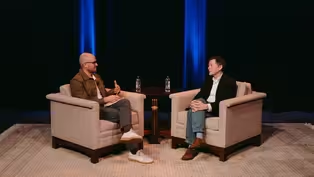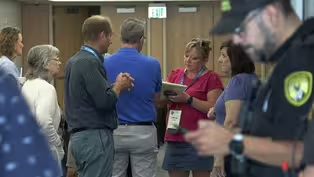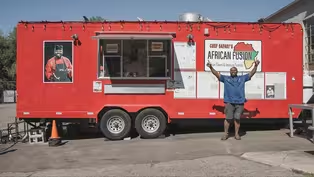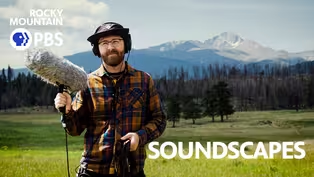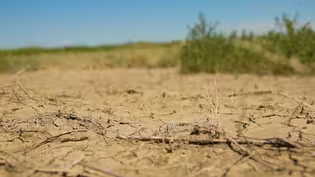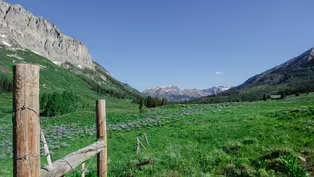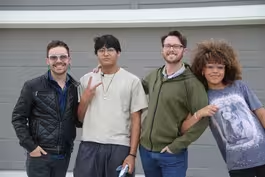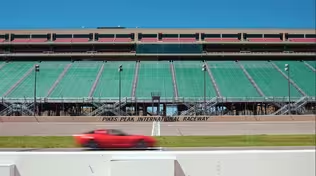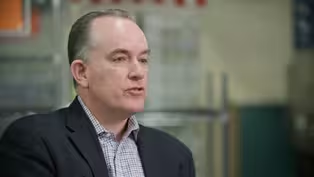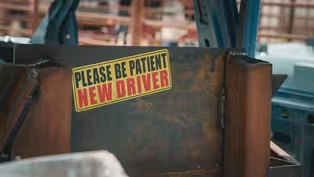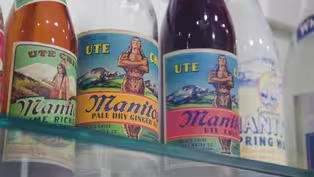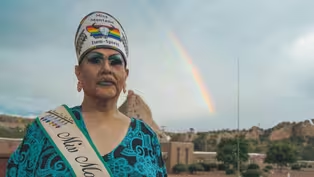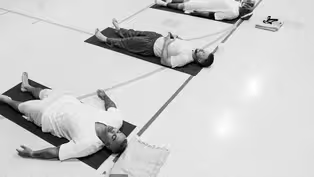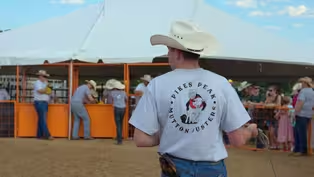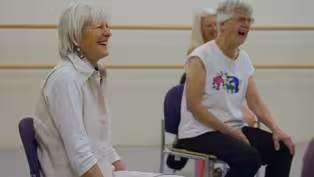On censorship with librarian and author James LaRue
Clip | 26m 9sVideo has Closed Captions
Librarian and author James LaRue discusses book bans and censorship in today's political environment
Longtime Colorado librarian and author James LaRue offers a Reality Check on book bans, censorship, and the First Amendment in today's political environment.
Problems playing video? | Closed Captioning Feedback
Problems playing video? | Closed Captioning Feedback
On censorship with librarian and author James LaRue
Clip | 26m 9sVideo has Closed Captions
Longtime Colorado librarian and author James LaRue offers a Reality Check on book bans, censorship, and the First Amendment in today's political environment.
Problems playing video? | Closed Captioning Feedback
How to Watch
is available to stream on pbs.org and the free PBS App, available on iPhone, Apple TV, Android TV, Android smartphones, Amazon Fire TV, Amazon Fire Tablet, Roku, Samsung Smart TV, and Vizio.
Providing Support for PBS.org
Learn Moreabout PBS online sponsorshipHello, I'm Gabriela Resto-Montero the managing editor of Rocky Mountain PBS.
And I'm here with James LaRue.
Over the course of, decades long as a librarian.
James through the service, a director for the American Library Association's Office of Intellectual Freedom and the executive director of the Freedom to Read Foundation For 24 years, he served as the director of the Douglas County Public Library School or district, not school not school district.
that's the district that I grew up in.
So thank you so much personally.
so he joins us today to discuss book bans and media censorship and his book on censorship, A Public Librarian examines cancel culture.
This is the book my daughter did not censor it, but, this is, on censorship.
Welcome.
James LaRue.
Thank you.
Gabriela, pleasure to be here today.
just to begin and just have a basis, you have, of course, extensive experience fielding book challenges, which is when library patrons ask for materials to be removed or restricted.
Right.
so can you situate for us the state of book banning in the US at the moment?
Well, we have seen the largest rise in attempts to remove or restrict library resources, not just books.
So it's digital resources, it's programs, it's exhibits, it's speakers.
It's almost everything a library does.
We've seen the greatest increase in challenges across the country since the founding of the American Library Association in 1876.
So it's surf's up.
so then just to dive into that a little bit more, over the course of your career, you mentioned in the book how it's accelerated.
You mentioned in 24 years in Douglas County, you had something like a little over 250 challenges 250 challenges, versus your first few weeks.
few months, in a new county.
And then you had like 15 or something like that.
That's correct.
so it seems as though the book challenges are accelerating.
You've seen this change.
what are those changes that you've seen in the types of people challenging library materials and the tactics that they use, particularly in the book?
You refer to it as the surge in 2021 and 2022.
So I think there are four reasons that people censor books.
The first one is just personal prejudice.
Somebody walks into the library, they see something that triggers them for whatever reason.
Could be childhood trauma, could just be a cranky day.
And they say, I don't like this.
Get rid of it.
And then the second one that I really encounter when I was in Douglas County, and this was that 1990 through 20 to 2014, there was a big shift in America that went from, let's say, fair parenting, like the latchkey children to a suddenly very protective and then maybe too overprotective from what I call the, you know, the helicopter parent to the Velcro parent, they're just stuck right on their head, and they follow their kids everywhere.
And then the third one, that I saw when I was at the office for Intellectual Freedom from about 2016 through the end of 2018, was what I would call a demographic panic.
And this was where suddenly it was almost as if America looked around and said, as of 2014, under the age of five, America is majority nonwhite.
That's not going to change.
And all of a sudden, the people that said the national narrative is all about me became aware that all these books were finally showing up in the library that reflected these perspectives of previously marginalized people.
And so they were like, know now 97% of the collection about me is not enough, and it needs to be 100%.
And then from the left, we began to see challenges as well, where it's like, well, 3% of these new voices is not enough.
Let's expand the number of those offerings.
And while we're about it, let's go back and take a look at those those books that have bigotry or homophobia in them and clean those up, too.
And so that was that demographic panic.
And then the fourth phase happening very much in 2021.
The surge, I'm sure, was very directed at trying to win the midterm elections.
And so the idea is, let's flip America's outrage switch, make everybody very, very angry, and they'll send in money and they'll vote for me.
So I think that's how it's changed.
That.
And also the difference of tactics fascinates me.
Back in the day, at Douglas County, somebody would fill out a form.
I'm upset about this.
I read the book and here's what I object to, and here's what I think you should get instead.
Now, what happens is 15 to 20 people show up unannounced at a public comment session at a school board or a public board meeting, and they have 25 or 30 books that they want to get rid of all at once.
And their tactic is, I'm going to find the naughtiest bit in this book, and I'm going to read it out loud to make everybody squirm and say how uncomfortable they are, and then say, I demand that you remove this.
And if they don't, then immediately it's political threats.
You're on the school board.
You should be recalled.
You're a superintendent principal, you should be fired.
You're a librarian.
And what we're seeing now is legislation across the country to say not only criminalize the book, but criminalize the people who provide access to them.
do you feel that that constitutes a kind of panic, or do you at some point, you also said that sometimes these, these types of the moral outrages or these types of tactics are cyclical.
How do you perceive this particular moment?
Well, when I was reading this book, I ran across something I read back when I was in high school, and it's a 1951 book that came out, by Eric Hoffer called The True Believer.
And at that time, like many of the best minds of his generation, he said, we just got through this World War two.
How did it happen that the world went crazy?
You know, I mean, all of a sudden you had Mussolini and you had Stalin and you had Hitler.
And, as he talked about that, he says, well, there are a number of things that seem to have to be in place before the world goes crazy.
And one of them is there's like a loss of national narrative.
There's a loss of there's a frustration and victimization.
And so Germany, between World War One and World War two is still paying reparations.
And it's like, well, we have this, you know, terrible problem.
We don't feel like we're on top of the world anymore.
Who do we blame?
So the scapegoating and then the targeting of many institutions, like fake news, like higher education, like libraries, famously book burning in Nazi Germany.
And so you can't help but say 1938 looks a lot like today because you know, where before they had Stalin.
Now we have Putin.
There was misleading and we have Erdoan and Xi and a rising tide of authoritarian across the world.
And so I think it's not so much panic anymore now.
I think it's flat out authoritarianism.
That's very, very sobering.
But you do have a framework, I think, that you provide a framework in the book for understanding what's going on and coping with it.
One of the ideas that I really thought was interesting, that I would love for you to expand upon, is the idea of books as inoculation, and that response, in terms of when parents feel that a book is not appropriate for their child or for a particular age group, that in fact the book and whatever it contains can act as a sort of vaccination against the world realities.
Yes.
Well, my favorite one was when I was a Douglas County.
All of a sudden, fairy tales were what everybody was coming after.
I thought, fairy tales.
What's that about?
And my favorite one was the little Red Riding Hood, where, you know, the she's going through the woods and she meets the wolf, and she's got a bag that has a bottle of wine and a baguette in it, and he runs the wolf runs ahead and eats granny and is about to eat little Red when the woodsman shows up, conks the wolf on the head, slices him open and granny steps out whole.
And at the very end, granny and the woodsman are having a glass of wine and the complaint was granny is a drunk, you know, you're promoting senior citizen alcoholism.
And I wrote back to say that, well, if I had just been eaten by a wolf and sliced open, I want a drink, you know, and I don't think that's out of line.
That doesn't seem outrageous to me.
But the more I started looking at fairy tales, it was like fairy tales have been around for a long time.
And the Grimm Brothers fairy tales are very grim indeed.
And so you take something like Hansel and Gretel, where the father takes his children into the forest and abandons them there to die.
But they don't die because they're very clever.
They leave little breadcrumbs, and they're very loyal to each other, and they're very clever, and they outwit the witch and, man by the name of Bruno Bettelheim, Austrian psychologist.
He said that the purpose of fairy tales is to help children name their fears and work out strategies to deal with them, because, in fact, the world is sometimes a scary place.
the flip side of the book banning in the censorship is that then these books go on to become bestsellers and sought after by a lot of the library patrons.
so can you speak a little bit to that?
And also the fact that a majority of library patrons and not just library patrons, but members of the community, of the public, don't actually support book bans.
Well, there's so much to talk about there.
I just read a Washington Post article.
They went back and said, of the 1000 challenges that were made to school libraries across the country, they were all filed by 11 people.
The American Library Association did a study and found that regardless of political party, about 70% of Americans say we are opposed to censorship.
And one of my favorite stories, and I know this sometimes embarrasses my friend who's the director there, but this was in Wellington, Colorado, and there was a woman who showed up.
She was the pastor's wife and said, here's 15 books that are obscene bestsellers, mind you, like purchased off the open market.
So probably unlikely to be illegal, right.
And just says all these are illegal or they're all obscene.
They need to be removed.
And the, the next month, a bunch more people came in like three times as many and said, well, wait a minute, is this how we want to be known?
Is this how we want people to think of our community as a place where we censor?
We don't.
And then the following month, the board decided to ban banning.
And so I feel like at this moment of that rising authoritarianism, it's very, very few voices.
They're very persistent.
They're very loud, and they make all kinds of claims.
And so this is a moment where I think we need to have civic courage, both for library administrators and for a citizen governing bodies to say, we hear what you're saying.
We'll certainly pay attention to that.
But we don't write the books, right?
The library doesn't.
We buy the books that are produced by our culture and I and I mentioned earlier about that 3%, 97%, there was a study done in Wisconsin, probably 30 years ago, about what percentage of children's books featured people of color.
And at that time, the population was somewhere around 28% Black.
And it was like less than 0.2% Black characters in children's literature.
And so as those demographics have shifted and the publishing has tried to say, well, we need to reflect the base of our potential customers.
So we're beginning to see more of these books showing up, and then we get back into that demographic panic.
Right, so I mean, I think when you talk about civic courage, I, I understood from the book that there is a process involved when there's a book challenge.
Right.
and there's a feedback mechanism.
So it's designed to have engagement, which I thought was really interesting in a way of, engaging with both good faith and bad faith arguments and getting to what the core of the complaint is.
you you draw a very, strong distinction between process and policy in addressing book challenges.
Can you talk a little bit more about that, just as a framework for people to engage with challenges, book banners, etc.?
Well, I guess I have to go all the way back to the First Amendment, which is the foundation of American librarianship, right?
The right to not only to speak freely, but to access the speech of others.
So the library was put together to enable people to go out and learn about the world, to ask questions about it.
And then in 1938, I went into great detail about this, the library Bill of Rights was formed.
And this is because two books were being challenged in Des Moines, Iowa.
One of them was Mein Kampf because it was foreign.
And then, right, not for anything obvious.
And then the second one was The Grapes of Wrath, because it was communist.
And so the idea is, you know, we don't need to know about these things.
it's, let's, we need to go back to the beginning.
Right.
Well, then the director of the Des Moines, Iowa Library went to his board and said, I want to do for the first time something called a library's bill of rights, which meant that we, the librarians, are not going to discriminate on the basis of national origin of sex, of religion, of all these kinds of things to say, we need to represent the entire world.
And then we also asserted for the first time that you, as a patron, have the right to come in and ask these questions.
You know that that's what the First Amendment means in practice.
But the other part of the First Amendment is that you have the right to redress, right to complain, And so somebody comes and said, well, I strongly disagree with this book, and I want to lodge my complaint.
And so this request for reconsideration process means we've talked to you.
And I always say that there are several steps.
I always want my staff to follow.
first.
You come and you say, I'm very upset about this book.
I opened up this book and I saw a racist stereotype in a children's book.
Okay.
Step one: I'm so sorry.
You're not sorry that they read a book.
You're not sorry that they had the book.
You're sorry that this was an unpleasant experience at the library.
Step two is like: what is the nature of your complaint?
Please help me to understand.
And then actively listen.
And when you're done, you say: so, your concern is that this book that shows a lazy Black fairy, you know, a diminutive person with wings, is a racist stereotype.
And you don't think that's appropriate for our collection?
Okay, now, you have said back to the person what the issue is, and then you say, but you probably didn't come in looking for something to make you mad.
You came in looking for something else.
We don't want censorship to be a failed service transaction.
What did you want originally?
And so the patron might say, I was looking for something that was a positive portrayal of biracial children.
We have books like that.
Let me show you.
Well, and then if that doesn't work, and 99% of the time it does, but that last 1%, somebody says, now I don't want to let this go.
I don't think this belongs in the library.
Then they get the form to say, be very specific.
We only begin this process when we do a written complaint.
I read the book.
This is what I think it's about.
This is what concerns me.
This is what you might consider as an alternative.
And then that would go to typically a committee.
We form a committee.
In my case, so I have six libraries.
I pull one from each.
I say all of us read this.
All of us, you know, look at the entirety, not just one panel or one naughty page, right?
The entire context.
And then they make a recommendation to the director.
Let's say, you know, we either keep it where it is, we reclassify it, move it somewhere else, or no, this book needs to be removed.
And then when that comes to me as a director, I make a decision.
I communicate that to the patron.
And then the patron, if they disagree with me, can appeal that to the citizen board.
And so and that's been a fascinating thing because, around the country, some boards, particularly school boards, happens more often than in public libraries.
They say, yeah, even though we have policies like this, we don't like this.
We think it's too sexy.
And so we're going to violate our policies.
And right now, you know, maybe I'll come back to more about this later, like what's going on in Alabama and what's been tried in Idaho and Mississippi and Georgia, all this legislation that's trying to criminalize librarians.
But, what, our attorneys are saying to us now is that a board should just say, did you receive the, complaint in writing?
We did.
Did you form a committee?
We did.
Did they make a recommendation?
They did.
Did you agree with it?
I did.
Did you communicate it to the patron Yes.
Then there is no grounds for an appeal.
And so the idea is that we want there to be a thoughtful, measured response to a challenge.
But we also want to stick to these policies that define our purpose in public life.
And that also the process of in the book, when you talk about the specific example of the children's book that had the racial stereotype in it and that patron did appeal the decision, the entire process is kind of, a learning experience for both sides.
That's correct.
We're trying to listen to each other.
Right.
And so I think that that's a very useful kind of perspective to keep in mind, certainly as a journalist, when you're getting feedback and when you're out in the world engaging with people.
So it really listen and to respond, but that you still have your standards set.
Well, that's exactly correct.
So you had another example in there about and just to switch gears a littl about a book challenge from a patron who had originally requested the book and that was Forgotten Fire by Adam Bagdasarian, about the Armenian genocide.
You wrote something that I thought was very interesting and immediately made me think about the TikTok ban, because you wrote removing a book about crimes committed against children doesn't stop them from happening.
This goes back to your idea about books as inoculation.
And obviously, libraries are not TikTok.
However, many of the same concerns that parents have with books in the library where they do have a framework for challenging those, those, those materials, exist on social media.
And that's where we know that a majority of children of young adults are kind of turning to for stories.
and so this idea of censorship on there, how does social media play into censorship as more kids turn to that?
Well, that's really interesting.
I think that, you know what?
I often wound up saying to people when the challenges were about books, you're worried that.
And to backtrack just a little bit, it's like there were two periods in a child's life when parents freak out.
One of them was at 4 to 6.
It's the end of infancy, beginning of childhood.
I want my baby back.
I don't want them to know about these things.
And then 14 to 16 is like, now they're like teenagers going to TikTok.
Now they're interested in the adult world.
Parents freak out again.
I don't want them to know about sex in particular.
And I always say that, speaking of inoculations, reading about it is the safest sex there is.
I mean, you're not going to get anything just from reading about it.
And in fact, it probably prepares you to what you might be encountering in the world.
And I think that TikTok, to a certain extent, is kind of the same thing.
But the difference is and the reason it's more visceral, it's image, you know, and so that you feel like that kind of gets past some of the linguistic filters.
Once again, parents kind of freak out as of what's really going on here.
people get suspicious about media when they don't really know what the purpose of the media is, is it just clicks?
Is it just money?
Is there a moral agenda?
Is there a political agenda?
Is there religious agenda?
And so the world is more complicated than it used to be.
And libraries, as you said, are kind of a little bit more intentional than that.
so can you speak a little bit to how we can understand the role that libraries play in our community and in our democracy?
I loved the beginning of the book where you talk about how a lot of times librarians respond to what patrons ask for.
It can be that simple, Well, and I say there's three ways that something winds up in a library.
One of them is for most public libraries, there's just five publishers left.
I mean, they've gobbled up almost every everybody else.
And so 80 to 85% of what you see in a public library comes from those publishers.
If they have a marketing budget of $150,000 per title, it's going to be popular.
And so we buy from mainstream publishers that have distributors that sell things to libraries.
We don't create them.
We reflect our culture.
The second thing is that, somebody comes in and they say, you know, a librarian does a review in one of five big periodicals to say this is appropriate for collections of this size or for this audience.
So it's recommended by peers.
And the last one is somebody just comes in and said, you know, I saw this book, this weird kind of site, can you track it down for me?
And so it's public requests.
So, you know, by the way, that I have come to think about libraries is that I believe we just hold up a mirror to our culture.
We don't invent it.
We're not trying to push anything in particular.
It's like, this is what people are talking about.
This is what they're writing about.
Here it is.
And if you see something else that you want, we buy it.
a friend of mine once said, a great library has something in it to offend everyone, but we don't buy books in order to offend.
We buy books in order to support the community.
But not everybody wants the same thing.
You.
That ties into your concept of kind of.
Not that it's a prescription, but this is this is actually a very optimistic book.
Despite the threat of authoritarianism, despite the book bans, you do have some counsel as to how civic engagement and social responsibility very specifically can speak to this moment.
Yes.
so can you expand on that for us a little bit?
Okay.
So again, it starts off so you're sitting on the as imagine you're a public library board member and 15 people show up and they're furious at you.
And they assert that, you know, the library is promoting all this is sexualizing content and trying to promote human trafficking, and you're pedophiles.
And the board kind of gets overwhelmed by that.
And then you realize that it's always the same three people who are coming to each meeting, and they're writing letters to the editor all the time.
But if you're not tracking those issues and you just say, okay, this is what people are talking about it, maybe it's a groundswell, but like that Washington Post study, it can be just 11 people driving a thousand challenges.
And so then the responses I think that we can save the institution stands up for its policies.
It adheres to its procedures.
But ultimately, it's not a decision of the library.
It's a decision of the community.
And so that whole story about Wellington, if a bunch of people show up and they say, well, you know, we disagree with these people and you know, that they have the right to request materials, but they don't have the right to say what other people can't read.
And so civic engagement at that point, it's like, are you paying attention to the library or the school board meeting?
Do you know about that controversy?
And if something shows up in the newspaper, are you writing something to the newspaper about your own opinions?
Or are you allowing a very small group of people to dominate the debate in public space?
And so I think that's, you know, just showing up at a public meeting and I say this, we don't give near enough credit to the many people who give their time to make their communities better, you know, so let's start with this notion that maybe that's worthy of respect and then look to say, what is your mission and how well are you doing that?
And if there's just a few people complaining about, you know, some of the things that you have, engage those people, invite them in, give them a seat at the table, say, well, you can't deny access to other people, but tell us what you would.
How do we expand?
How do we reflect your concerns?
Tell us what you would like to see.
That's right.
I love the idea of not ceding the ground that you also other people have a right to speak up, as do you.
Yeah, well, there was a time that I was engaged in some, conflict with the focus on the family, which was a religious group down in Colorado Springs.
And they were kind of targeting our library to, you know, remove family.
The books that they said were not family friendly.
So I joined focus on the family, and I went to their training about how to take over school boards and how to take over library boards.
And when they would come in and talk to me, I would say, oh, I was at that meeting.
I said, but here's the thing that I want you to know.
We buy books that are promoted by focus on the family, and they circulate very well.
And if you're saying, I want a seat at the table, we're pulling out a chair, have a seat.
But now that you're here, you can't tell everyone else that they have to shut up.
You know?
And so the idea that we serve you, too, you two are part of our community, but you can't deny service to the other people who also support the library.
as we wrap up, I would like for you to just share or, the stage is yours to kind of, share anything that I haven't asked about that you feel it's very important for people to understand about the role of, public libraries and also, just that role that they play in, in this particular moment of of, as you, said, rising authoritarianism and, book bans and censorship.
I think I could put it it's like the binary choice, which is always a little bit slippery because there is nuance.
But the idea is that, what we hear from mostly the right is tremendous fear.
We can't expose our children to that way where we have to protect them.
We cannot allow them to know what's going on.
And then on the other side, it's like curiosity.
And I think that the whole purpose of the public library is to honor the fundamental dignity of individual inquiry.
You get to ask questions, and that's your right.
As an American.
And so, as I look around and say, what are all the problems in the world today?
Number one is not that our children are reading too much, you know, let's encourage them to read.
And in fact, one of my comments about this is that stop blaming the library for books we didn't write, or for things that your child might run across.
Why not talk to your child and say when you read something, come and talk to me about it.
Let's talk about what our values are together if I just may ask you, what is your favorite band book?
You know, I am very taken by, Beloved by Toni Morrison, and I, I don't know if I can say this on the radio, but I've just about decided that what marks a classic is the ability to piss off every new generation.
You know?
And if you can find something that irritates each new generation, you might have a classic in a very different way, but each new generation finds its own offense.
Beautiful.
Thank you so much.
Thank you for coming here today to talk to you.
Really, really fun.
I really app
When life gives you a house, move it.
Video has Closed Captions
Clip | 1m 30s | Owning a home had always seemed impossible. Then a historic cabin became available. (1m 30s)
Meet the election judges behind La Plata County’s voting process
Video has Closed Captions
Clip | 4m 26s | Selected community members in La Plata County began training as election judges. (4m 26s)
Sheldon Nuñez-Velarde: Master Potter of the Jicarilla Apache Nation
Clip | 5m 45s | The Jicarilla Apache honor their longstanding relationship to the natural world. (5m 45s)
Rowena Mora: Master Basket Weaver of the Jicarilla Apache Nation
Clip | 4m 27s | The Jicarilla Apache honor their longstanding relationship to the natural world. (4m 27s)
Plant Medicine of the Jicarilla Apache
Clip | 3m 27s | The Jicarilla Apache honor their longstanding relationship to the natural world. (3m 27s)
The Jicarilla Apache Creation Story
Video has Closed Captions
Clip | 4m 57s | The Jicarilla Apache honor their longstanding relationship to the natural world. (4m 57s)
Clip | 5m 37s | The Jicarilla Apache honor their longstanding relationship to the natural world. (5m 37s)
Ducklings Told to Protect the Lake
Clip | 2m 35s | The Jicarilla Apache honor their longstanding relationship to the natural world. (2m 35s)
Video has Closed Captions
Clip | 4m 58s | Inside the high-stakes world of competitive pumpkin growing (4m 58s)
Temple Grandin analyzes undercover video taken inside Superior Farms slaughterhouse Denver
Video has Closed Captions
Clip | 1m 54s | Undercover video taken inside Denver's Superior Farm plant with commentary from Temple Grandin (1m 54s)
The costuming family behind 60 years of handmade costumes in Colorado Springs
Video has Closed Captions
Clip | 4m 56s | The Saunders family once operated one of the largest custom costume shops in Colorado Springs (4m 56s)
Voters to decide fate of Denver's only slaughterhouse
Video has Closed Captions
Clip | 8m 14s | Superior Farms, the city’s only slaughterhouse, would be shut down if voters pass Ordinance 309. (8m 14s)
Keeping tradition alive with the CSU marching band
Video has Closed Captions
Clip | 2m 49s | Inside the Colorado State University marching band. (2m 49s)
After 40 years, one of Colorado’s most challenging math competitions may be coming to a close
Video has Closed Captions
Clip | 5m 19s | UCCS mathematics professor Dr. Alexander Soifer's Soifer Mathematical Olympiad turned 40 this year (5m 19s)
Behind the scenes at the Maurice Sendak exhibit
Video has Closed Captions
Clip | 3m 37s | Behind the scenes preparing for Denver Art Museum’s Maurice Sendak “Wild Things” Exhibit (3m 37s)
Video has Closed Captions
Clip | 3m 5s | The Kit Carson Café fills stomachs, job boards and the need for community gathering spaces (3m 5s)
Inside Colorado's newest high school sport: girls' flag football
Video has Closed Captions
Clip | 2m 44s | Inside Colorado's newest high school sport: Girl's flag football (2m 44s)
Painting a mural from start to finish
Video has Closed Captions
Clip | 2m 31s | Greeley painter, Alonzo Harrison, hits his stride in a new mural at WeldWalls festival. (2m 31s)
Video has Closed Captions
Clip | 2m 9s | Southern Ute Vice Chairman Lorelei Cloud explains the importance and sacredness of water to all. (2m 9s)
Video has Closed Captions
Clip | 4m 11s | Studying the ecological importance of ground squirrels at the Rocky Mountain Bio Lab. (4m 11s)
Video has Closed Captions
Clip | 3m 8s | Over 1700 elementary to high school girls explore careers in transportation and construction (3m 8s)
New suburban opioid treatment clinics aim to address a less visible need outside Denver
Video has Closed Captions
Clip | 2m 29s | Community Medical Services, an addiction treatment program, is opening six new suburban locations (2m 29s)
How Coloradans are working to overcome the political divide
Video has Closed Captions
Clip | 4m 8s | Braver Angels uses cross partisan conversations to overcome political divides. (4m 8s)
Chile farmer and cofounder of the Pueblo Chile & Frijoles Festival Dr. Mike Bartolo
Video has Closed Captions
Clip | 3m 21s | The retired CSU Fort Collins researcher has spent decades developing new types of chile peppers (3m 21s)
Colorado rural hospital relies on nurse midwives to provide quality care, keep costs down
Video has Closed Captions
Clip | 4m 30s | Call the Midwife: Colorado rural hospital leans on nurse midwives for quality care, lower costs (4m 30s)
How a measure makes it onto Colorado's election ballot
Video has Closed Captions
Clip | 4m 23s | Here's how an initiative goes from an idea to a ballot measure (4m 23s)
Water project advances Tribal sovereignty, lifts communities in Four Corners region
Video has Closed Captions
Clip | 3m 31s | A look at how The Dolores Project changed lives in the Colorado Ute communities. (3m 31s)
The secret collection in Rangely that they don't want to keep under wraps
Video has Closed Captions
Clip | 2m 38s | Everyone has a hometown, but not all have a car museum the size of a football field in them. (2m 38s)
For Colorado’s deaf high school volleyball players, the mindset is still the same
Video has Closed Captions
Clip | 4m 39s | The over 65 year-old volleyball program for deaf students starts the high school season (4m 39s)
First-of-its-kind mandate requires in-person voting in Colorado jails
Video has Closed Captions
Clip | 3m 33s | This election, every jail in Colorado will hold an in-person voting event for eligible voters. (3m 33s)
Why some Colorado schools have staff in firearms training
Video has Closed Captions
Clip | 5m 52s | Schools, particularly in rural areas, consider training and arming school staff (5m 52s)
This Denver barbershop is staffed by formerly incarcerated barbers
Video has Closed Captions
Clip | 2m 51s | R&R Head Labs hires formerly incarcerated barbers (2m 51s)
Video has Closed Captions
Clip | 2m 42s | How poetry provided an outlet to Fort Collins Poet Laureate, Melissa Mitchell. (2m 42s)
Video has Closed Captions
Clip | 4m 36s | Local newsrooms in Colorado are shrinking at alarming rates (4m 36s)
Ken Burns on his new film, "Leonardo da Vinci"
Video has Closed Captions
Clip | 36m 7s | Ken Burns met with Rocky Mountain PBS to discuss his latest documentary on Leonardo da Vinci (36m 7s)
Election officials held a secret conference in Grand Junction amid security concerns
Video has Closed Captions
Clip | 2m 43s | As conspiracy theories and lies about elections spread, the job of county clerk gets more stressful. (2m 43s)
Chef Safari brings a taste of Africa to Durango
Video has Closed Captions
Clip | 3m 14s | Chef Safari brings African fusion cuisine to Durango, blending global flavors with cultural roots. (3m 14s)
Meet the sound artist who's exploring the symphony of nature at Rocky Mountain National Park
Video has Closed Captions
Clip | 3m 37s | Meet the sound artist who's exploring the symphony of nature at Rocky Mountain National Park (3m 37s)
Water to water, dust to dust in the Arkansas Valley
Video has Closed Captions
Clip | 4m 4s | Agriculturists unite with ag workers to sustain farms and farm towns in the Arkansas Valley (4m 4s)
Branching out: How one family’s science roots continue to spread
Video has Closed Captions
Clip | 4m 57s | The Inouyes have been doing science for more than 50 years up in Gothic. (4m 57s)
The Colorado Youth Pipe Band is training Colorado’s next generation of bagpipers
Video has Closed Captions
Clip | 3m 23s | The Colorado Youth Pipe Band is training Colorado’s next generation of bagpipers (3m 23s)
A Colorado LGBTQ couple's journey from foster care to adoption
Video has Closed Captions
Preview | 5m 9s | Meet this LGBTQ+ family and their journey through the foster care system (5m 9s)
NASCAR or family car? Street racers hit the track
Video has Closed Captions
Clip | 3m 50s | Can racing on designated tracks curb illegal street racing? Local police hope so. (3m 50s)
Video has Closed Captions
Clip | 4m 43s | Matt Crane explains why election results in Colorado are reliable. (4m 43s)
Inside the tight-knit family of demolition derby
Clip | 2m 47s | For decades, Greeley, Colorado has gathered to enjoy demolition derby. (2m 47s)
What’s the big deal about Manitou’s mineral springs?
Video has Closed Captions
Clip | 5m 13s | Manitou’s namesake water feature has shaped the town geologically, economically and culturally (5m 13s)
Somewhere Over the Rainbow: Pride and Drag in Navajo Nation
Video has Closed Captions
Clip | 4m 40s | On the last weekend of June, Navajo Nation celebrated Diné Pride at its capital. (4m 40s)
Video has Closed Captions
Clip | 5m 4s | Incarcerated students find physical and spiritual healing in yoga program (5m 4s)
Baa Baa Buckaroos continue Mutton Bustin’ tradition at Pikes Peak or Bust Rodeo
Video has Closed Captions
Clip | 4m 7s | The next generation of rodeo stars get their start on the backs of sheep (4m 7s)
Dancing with Parkinson’s, without limits
Video has Closed Captions
Clip | 4m 1s | Boulder residents with Parkinson's disease find relieve and community in free dance class. (4m 1s)
Providing Support for PBS.org
Learn Moreabout PBS online sponsorship
- News and Public Affairs

Top journalists deliver compelling original analysis of the hour's headlines.

- News and Public Affairs

FRONTLINE is investigative journalism that questions, explains and changes our world.












Support for PBS provided by:
